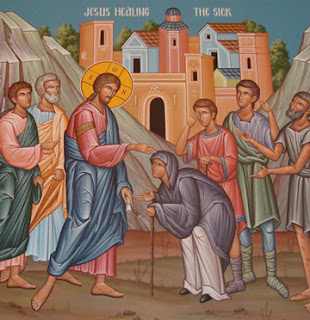4th Epiphany
Luke 13: 10-17
 |
| Kenneth Dowdy |
Once
he was teaching in a synagogue on the Sabbath. And behold, there was a woman
who had a spirit weakening her for eighteen years: she was bent over and could
not stand upright [lift her head all the way up]. When Jesus saw her, he called
her to him and said to her, “Woman, you are released from your illness!”
He laid his hands upon her, and at once she was
able to straighten up. And she praised the power of God. Then the leader of the
synagogue, indignant because Jesus had healed on the Sabbath, said to the
people, “There are six days for doing work; on those days you can come and let
yourselves be healed—but not on the Sabbath.”
But
the Lord replied, “You hypocrites! Does not every one of you untie his ox or
his ass from the manger on the Sabbath and lead it away to the water trough?
But this daughter of Abraham, who was held bound by the dark might of Satan for
eighteen years, wasn’t supposed to be released from her bondage on the day of
the Sabbath?”
All his opponents were put to shame by these words,
and the people rejoiced over all the signs of spiritual power that happened
through him.
4th Epiphany
February 2, 2020
Luke 13: 10-17
 |
| Tissot |
The woman in the Gospel could not stand upright. She was subject to the hardening imprisonment of the adversary. The effect of such imprisonment was likely painful misery,
a sense of being severely hampered, forced to face earthward like an animal,
cut off.
Jesus is in the synagogue
teaching. It is the Sabbath, the day of rest, the day for remembering back to
the human being’s divine origins. It is the day for remembering how God created
human beings in His own image and likeness: radiant with light, bursting with
life, exuding love.
Christ, the Creator, calls the woman
to him. And she responds to his call. The power of his divine, creating Word
releases her soul and spirit from the adversary’s dark might. Then Christ
places his hands on her and creates her anew. She rises upright. The image of
the original human being is restored in her. Once more, she is the picture of
humanity: head in the stars, feet firmly planted on the earth, heart free.
But there are others there whose
souls continue to be bound by Satan’s dark power. They indignantly chastise Him
and all the others for doing work on the Sabbath instead of resting and
remembering. How ironic that for them, remembering how human beings once were,
seems more important than re-creating, restoring the human being in front of them.
And Christ’s response once
again overcomes the dark power that works, not only in human bodies but also in
human souls. For love and goodwill, like water, like sunshine, will flow
outward wherever needed. To stop Christ’s will is to darken the sun, to dam up
the life-giving waters.
The results of Christ’s admonishment
are shame and joy. Shame for what we recognize in ourselves. Joy in recognizing
the healing warmth of the Christ-Sun. And hope—the hope of healing for all humankind
As Denise Levertov says:
It’s
when we face for a moment
The
worst our kind can do, and shudder to know
The
taint in our own selves, that awe
Cracks
the mind’s shell and enters the heart:
Not
to a flower, not to a dolphin,
To no
innocent form
But
to this creature vainly sure
It
and no other is god-like, God
(out
of compassion for our ugly
failure
to evolve) entrusts,
As
guest, as brother,
The
word.*
* “On the Mystery of the
Incarnation”, in The Stream and the Sapphire, by Denise Levertov, p. 19
.














